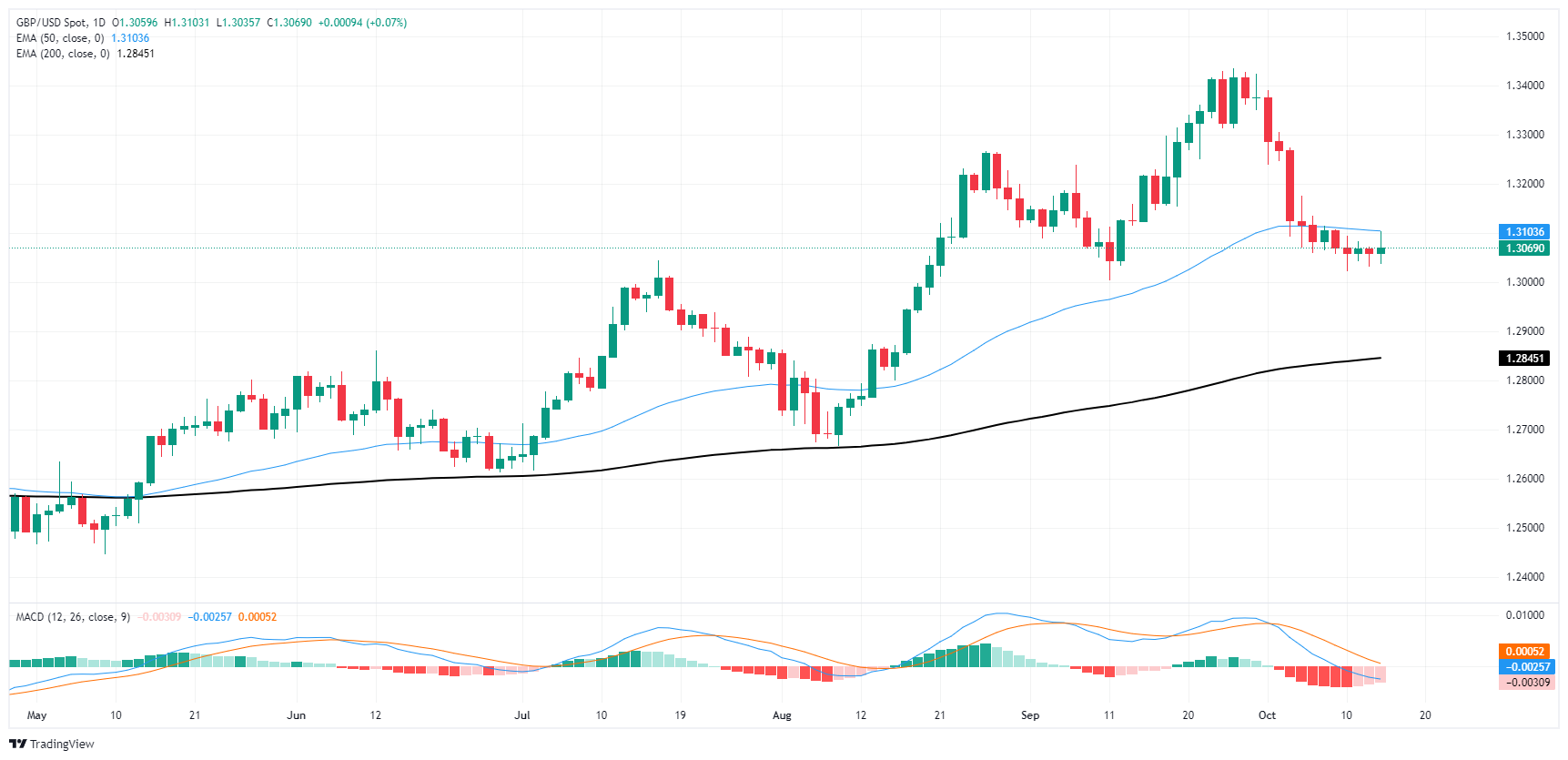- GBP/USD remained just north of 1.3000 for the fourth consecutive trading day.
- UK jobs figures were not relevant on Tuesday.
- Cable markets are awaiting the next UK CPI update on Wednesday.
GBP/USD remained in familiar territory for the fourth consecutive trading day on Tuesday. Cable continues to oscillate in a dead zone between 1.3100 and 1.3000 as GBP traders wait for significant data updates from the UK before deciding on a direction.
UK wages data was largely as expected on Tuesday, but GBP traders took note of an unexpected rise in September Claimant Change, which jumped to 27.9K for the month, up from 20.2 Expected K compared to 23.7K in August. On the other hand, the UK ILO unemployment rate also fell to 4.0% from the expected 4.1%.
Wednesday’s upcoming UK Consumer Price Index (CPI) inflation figures are expected to decline in September. Headline CPI inflation for the year ended September is expected to fall to 1.9% year-on-year from 2.2% in the previous period. Meanwhile, annualized core CPI inflation is expected to decline to 3.4% year-on-year from 3.6% previously.
US Dollar traders will be keeping an eye on US retail sales figures for September on Thursday, with UK retail sales scheduled for release on Friday. US retail sales are expected to rise to 0.3% m/m in September from 0.1% previously, while UK September retail sales figures are forecast to fall into contraction territory, from 0.1% to – 0.3%.
GBP/USD Price Forecast
GBP/USD remains trapped in a volatility trap, squeezed between the main price level of 1.3000 and the 50-day EMA falling at 1.3100. Technical indicators have stalled on short-term congestion warnings as Cable teeters on the lower end of a pullback from late September peaks just north of 1.3400.
GBP/USD daily chart
The British Pound FAQs
The British Pound (GBP) is the oldest currency in the world (886 AD) and the official currency of the United Kingdom. It is the fourth most traded currency unit in the world, with 12% of all transactions and an average of $630 billion per day, according to 2022 data.
Its key currency pairs are GBP/USD, also known as “Cable”, which represents 11% of the forex market, GBP/JPY, or the “Dragon” as it is known to traders (3%), and EUR/GBP (2%). The pound sterling is issued by the Bank of England (BoE).
The most important factor influencing the value of the Pound Sterling is the monetary policy decided by the Bank of England. The Bank of England bases its decisions on achieving its main objective of “price stability”, that is, a stable inflation rate of around 2%. Its main tool to achieve this is the adjustment of interest rates.
When inflation is too high, the Bank of England tries to contain it by raising interest rates, which makes access to credit more expensive for individuals and companies. This tends to be positive for the GBP, as higher interest rates make the UK a more attractive place for global investors to park their money.
When inflation is too low, it is a sign that economic growth is slowing. In this scenario, the BoE will consider lowering interest rates to make credit cheaper, so that companies borrow more to invest in projects that generate growth.
The published data gauges the health of the economy and may influence the value of the Pound sterling. Indicators such as GDP, manufacturing and services PMIs, and employment can influence the direction of the Pound.
A strong economy is good for the British pound. Not only does it attract more foreign investment, but it may encourage the Bank of England to raise interest rates, which will directly strengthen the Pound. Otherwise, if economic data is weak, the pound is likely to fall.
Another significant data for the pound sterling is the trade balance. This indicator measures the difference between what a country earns from its exports and what it spends on imports during a given period.
If a country produces highly sought-after exports, its currency will benefit exclusively from the additional demand created by foreign buyers wishing to purchase these goods. Therefore, a positive net trade balance strengthens a currency and vice versa for a negative balance.
Source: Fx Street
I am Joshua Winder, a senior-level journalist and editor at World Stock Market. I specialize in covering news related to the stock market and economic trends. With more than 8 years of experience in this field, I have become an expert in financial reporting.






